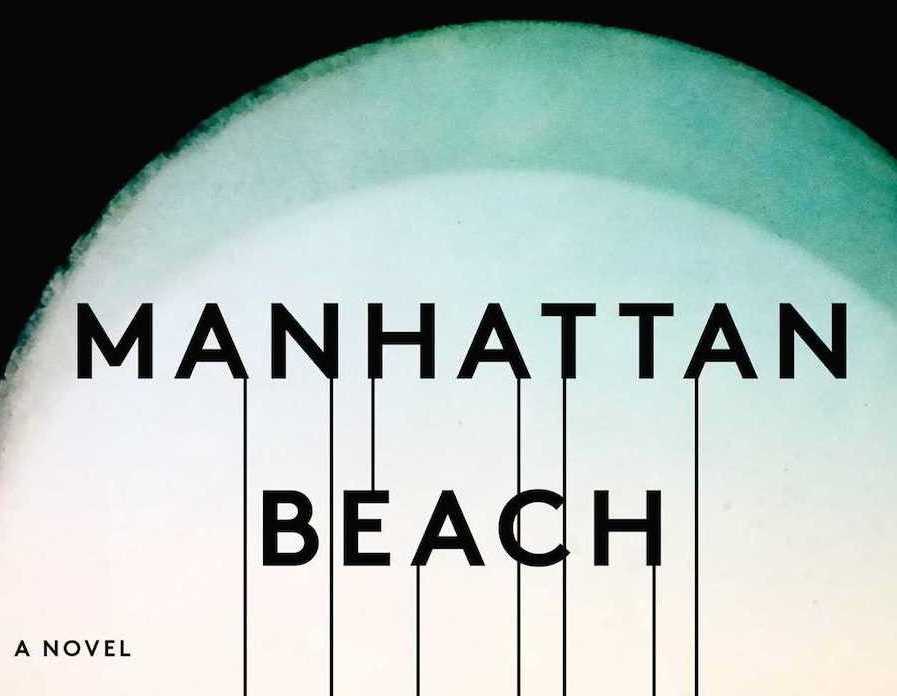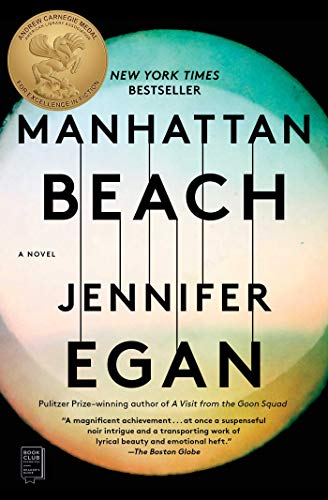Manhattan Beach
Pulitzer Prize winner Jennifer Egan's new novel blends a jazzy range of tones. Simon & Schuster
Simon & Schuster
“Manhattan Beach”
A book by Jennifer Egan
It has been seven years since we got “A Visit From the Goon Squad,” but the presence of Jennifer Egan’s Pulitzer Prize-winning book still hangs in the air. Was it a novel? A collection of short stories? Who cares? It was a tour de force. Reaching back and forward in time, writing in the first, second and third person—with a PowerPoint presentation to boot—Egan demonstrated her skill across a whole catalog of forms, tones and styles.
So how does an author follow up such a spectacular variety show?
Egan has wisely chosen not to compete with “Goon Squad” and its postmodern razzle-dazzle. Instead, her new book leaps into the past, offering us a story built on sturdy older forms polished to a high sheen.
“Manhattan Beach”—longlisted for a National Book Award even before it was released—is a historical novel set during World War II in New York. The country isn’t entirely in agreement about entering another foreign war, but cue the big band, cheer the troops. This is a nation finally crawling out from under the Depression.
Click here to see long excerpts from “Manhattan Beach” at Google Books.
Our heroine is Anna Kerrigan, a dutiful daughter with a well-concealed wild streak. “Her role,” Egan writes, “was to be impervious to the vices around her”—or at least to appear that way. As soon as Anna is old enough, she takes a tedious job working alongside “the marrieds,” measuring machine parts at the Brooklyn Naval Yard. She’d much rather join the intrepid divers who repair ships in the harbor, but that’s no job for a woman. Fortunately for Anna, the war has depleted the pool of qualified men, which gives her a chance to don a 200-pound diving “dress” and take the plunge.
She may be persistent, but it’ll take more than that to win respect from her skeptical lieutenant. “I like you, Miss Kerrigan,” he tells her patronizingly. “You’re full of spirit. My advice is, go back to your shop—whatever is it you do here at the yard—and give that work everything you have.”
All the harbor details—from the dangerous mechanics of underwater work to the irritating chauvinism of Navy officers–feel dutifully researched. The whole novel, in fact, boasts its tweedy historical accuracy. If there’s a car, it must be “a new Series 62 with cream-colored lambskin upholstery.” But there’s something predetermined about this story of a spunky young woman breaking through gender barriers in wartime.
Far more engaging are the shadowy actions swirling around Anna. Her crafty father kept the family fed and clothed through the Depression by working for a racketeer named Dexter Styles. But he had abandoned them several years earlier, leaving his wife and Anna to care for Anna’s sister, who is profoundly disabled. Here, “Manhattan Beach” attains its most affecting moments, in scenes that capture the unexpected delight and crippling guilt of raising a handicapped child. Egan knows that hope is a necessary salve and a cruel taunt for such families. And, as elsewhere, she has carefully created the American economy just beginning to recover from the Depression. It’s a GOP paradise in which people with pre-existing conditions aren’t weakened by character-sapping crutches like affordable health insurance.
“Manhattan Beach” may not offer the brilliant variety of forms found in “Goon Squad,” but Egan is still blending a jazzy range of tones in these chapters, from Tennessee Williams’ apartment-trapped despair to Herman Melville’s adventures at sea. And when Anna goes to a nightclub and recognizes Styles, her father’s old employer, the novel swings into a particularly rich noir romance. “The coincidence felt miraculous,” Anna thinks, but this “handsome gangster in his beautifully cut suit” might know what had happened to her errant father.
Will Anna pursue that secret even as she’s swept up into a torrid affair with this well-dressed killer?
Egan has some fun mimicking the overheated pulp of her novel’s predecessors with their cliffhanger chapter endings. This is a world in which gangsters say, “One more like that, and I’ll toss you off the pier myself. You can tell it to the fishes.” And Anna’s attraction to Dexter draws her into a tryst that sets the pages on fire. “The hunger he’d wakened in her banished every scruple,” Egan writes. “She climaxed like someone in a seizure,” which sounds like she could use oxygen more than a cigarette.
The story’s most entertaining aspect may be its portrayal of Dexter, with his carefully compartmentalized world, “an array of ancillary rackets both legal and illegal.” He moves between thugs and bankers, ordering hits just as confidently as he orders drinks. A loving father and an attentive husband, Dexter inspires fear in his minions but feels terror himself when he visits an elderly crime boss who makes his own cheese and speaks in a deadly code of pleasantries.
All these strong currents—from noir thriller to family drama to wartime adventure—eventually return to the private moment that opens “Manhattan Beach.” If that ending is surprisingly hopeful, it’s never false, and it dares to satisfy us in a way that stories of an earlier age used to.
Ron Charles is the fiction editor of The Washington Post.
©2017, The Washington Post
Your support matters…Independent journalism is under threat and overshadowed by heavily funded mainstream media.
You can help level the playing field. Become a member.
Your tax-deductible contribution keeps us digging beneath the headlines to give you thought-provoking, investigative reporting and analysis that unearths what's really happening- without compromise.
Give today to support our courageous, independent journalists.







You need to be a supporter to comment.
There are currently no responses to this article.
Be the first to respond.